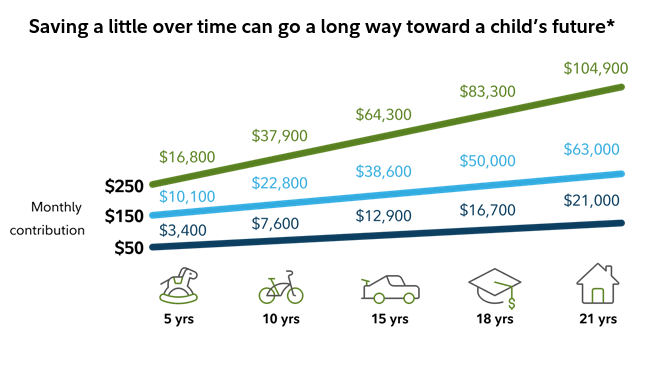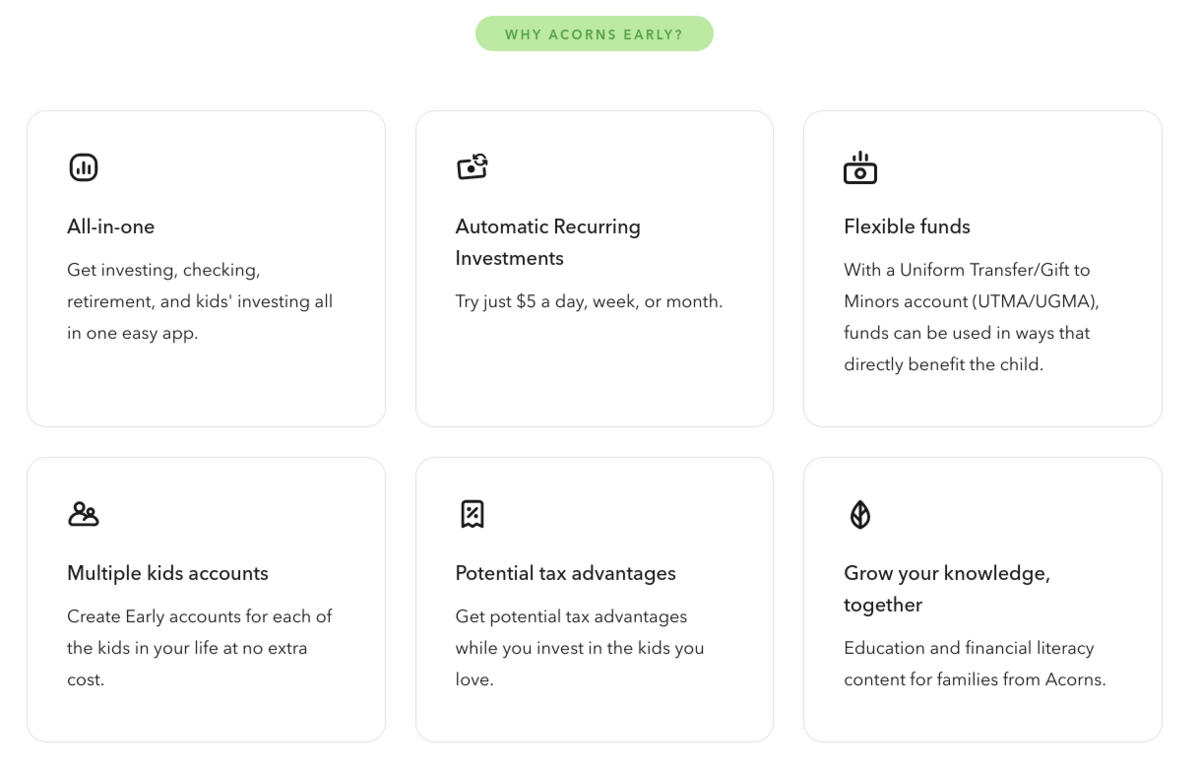I’m willing to bet that most people reading this article right now wish they started investing when they were a kid. I’m here to help you out so that the money-minded kid in your life isn’t saying the same thing in 30 years.
Even though kids can’t invest in stocks themselves, there are several accounts designed to help adults start investing on behalf of minors.
In this article, I’ll teach you how to take advantage of these accounts to help set children up for a prosperous and financially successful future.
I’ll also throw in some fun ideas for ways to get children into investing, like the best stocks for kids to get them interested and help make investing fun…
The best FREE resource to teach children financial literacy is…
Modak is an invaluable (and FREE) tool to help teach children essential money management skills. Designed with a kid-friendly interface, it introduces financial literacy through interactive lessons, games, and real-life budgeting scenarios, making complex concepts like saving, spending, and earning understandable and fun.
Modak encourages responsible financial behavior by allowing kids to set savings goals, earn “allowance” through tasks, and even track their spending with parental guidance. Smarter financial health starts here — create your FREE account today.
Best Stocks for Kids in 2025: The Bottom Line
Can kids invest in stocks? Not directly.
Kids can’t buy stocks themselves, so you’ll have to do your kid’s investing for them. The good news is that most major brokerages give you access to special accounts like custodial IRAs and 529 plans, so it’s really not any harder than investing for yourself.
Some types of accounts aimed at investing for kids come with annual contribution limits and restrictions on the types of assets you can purchase. I’ll discuss this more at the end of the post.
Our Top 2 Best Brokerage Accounts for Kids
Now that you know what kinds of accounts you can open for your children, let’s take a look at my favorite places to open a brokerage account for your kid.
Acorns Early
Overall rating: ⭐⭐⭐⭐⭐
Account minimum: $5
Acorns Early is a UTMA/UGMA account run by the American fintech company, Acorns. Acorns Early makes it easy to manage your kid’s investments, and I love that you can link it to your own Acorns account to get access to everything in one place. Plus, right now you can get a $20 bonus when you set up your first recurring deposit on Acorns — just use any of the Acorns links in this post.
Opening an account takes less than five minutes, and you can manage the account in Acorns’ easy-to-use mobile app. If you just want an easy way to buy stocks for your kids, Acorns Early is my recommendation.
Fidelity
Overall rating: ⭐⭐⭐⭐⭐
Account minimum: No minimum
Fidelity also offers a custodial UTMA/UGMA account with $0 commissions on all online stock and ETF purchases. If you already use Fidelity as your main brokerage, adding an account for your child is quick and painless.

If you prefer to open a 529 plan instead of a UTMA/UGMA account, Fidelity has you covered. I don’t necessarily recommend both types of accounts, but if you want to stay under the $17,000 per year tax-free limit, it’s nice to have the option to open a 529 without having to search for a different brokerage.
What Are the Best Stocks for Kids?
Can kids invest in stocks? No, but you can invest on their behalf! So you’ve opened your custodial account; now what? Here are some smart places to start:
Blue-Chip Stocks
Slow but steady wins the race! For investments that can grow along with a child, blue-chip stocks are the gold standard. These are large, well-established companies with strong track records and stable earnings growth are often called blue-chip stocks. They typically include companies in essential sectors like energy, finance, or telecommunications. These stocks offer stability, reliable returns, and often dividends, making them ideal for long-term portfolios.
Dividend Stocks
Dividend stocks are offered by companies that regularly pay out a portion of their profits to shareholders in the form of dividends. These dividends are typically distributed quarterly but can also be issued monthly, semi-annually, or annually. Companies offering dividend stocks are usually well-established, financially stable, and have a track record of profitability. Dividends can be reinvested, which compounds your investment over time. Often, blue-chip stocks are also dividend stocks.
Index Funds or ETFs (Exchange-Traded Funds)
If you want to diversify in an instant, consider index funds or ETFs that track major market indices (like the S&P 500) offer exposure to a broad range of growth stocks. These funds mitigate individual stock risk and can provide consistent returns, benefiting from the overall growth of the market while reducing volatility.
Growth Stocks
These are stocks with high growth potential. Right now, they’re most often found emerging industries like technology, renewable energy, or biotech. These companies reinvest their earnings to expand rather than paying dividends. While growth stocks may be more volatile, they can potentially offer substantial returns over the long term.
Can Kids Buy Stocks?
No, kids can’t buy stocks in the U.S.
Can kids invest in stocks indirectly through a parent or guardian? Absolutely!
Children under the age of 18 are not allowed to open an investment account themselves, so you’ll have to invest for your kid until they’re old enough — 18 in most states.
If you want to get your kid interested in investing, you have options. Let’s go over my three favorite types of special accounts you can use to buy stocks for your kid.
UTMA / UGMA Accounts
My favorite way to buy stocks for kids is through a Uniform Transfers to Minors Act (UTMA) or Uniform Gift to Minors (UGMA) account. These accounts allow you to act as the custodian for your kids’ investments until they turn anywhere from 18 to 25, again, depending on where you live.
There are two reasons why I think UTMA/UGMA accounts are the best way to buy stocks for kids…
- They don’t come with annual contribution limits, although contributing more than $17,000 in a single year could trigger the federal gift tax as of 2023.
- There are no restrictions on the types of assets you can purchase. UTMA and UGMA accounts let you buy stocks, funds, cash, and other securities — they’re basically just ordinary investment accounts. UGMA accounts also let you contribute real estate and less common assets like paintings, patents, and royalties.
UTMA and UGMA accounts also let you use the money in the account for any living expenses that benefit the child, like food, housing, and education.

Custodial IRA
Custodial IRAs are very similar to traditional or Roth IRAs, with the primary difference being that you act as the account manager until your child turns 18 or 21.
You can choose between a traditional IRA, which defers the tax burden when the money is distributed, and a Roth IRA, which taxes contributions and allows money to be withdrawn tax-free in retirement.
Just like traditional and Roth IRAs, custodial IRAs require that your child has earned income, so they’re better for teenagers with a part-time job — unless your toddler has a side gig selling Legos after preschool. You can only contribute $6,500 or 100% of your child’s earned income per year as of 2023.
Also, like traditional or Roth IRAs, your child can only withdraw money without a penalty after the age of 59.5 unless the money is used for certain approved purposes, like paying for education or buying a first home.
I like Fidelity’s Youth IRA the best. It doesn’t have any opening or closing costs, and stocks, ETFs, and options all have $0 commissions when you make purchases online — who calls a broker these days anyway?
529 Plan
If you’re looking to buy stocks for your kid with the sole purpose of paying for college down the road, a 529 plan is what you want. 529 plans are more limited than custodial IRAs and UTMA/UGMA accounts, so you might not be able to buy stocks directly.
Most 529 plans limit you to a select few ETFs and mutual funds, which is a bit of a bummer. On the bright side, many 529 plans have age-based strategies that manage the investment for you, much like target-age retirement strategies.
One of the biggest benefits of opening a 529 for your child is that the contributions are tax-advantaged. Unlike UTMA/UGMA accounts, your earnings are not taxed in a 529 plan.
Another advantage to a 529 plan is that there aren’t any contribution limits as you find in a custodial IRA. I like this aspect of 529s a lot since it lets you invest more when you can without worrying about spreading your contributions out strategically from year to year.
At-a-Glance: Best Brokerage Accounts for Kids in 2025
- Best interface: Acorns Early
- Best features: Fidelity
Final Word: Stocks for Kids
So, can kids buy stocks? Unfortunately, no. However, even though kids can’t invest in stocks themselves, they can still get experience and learn about investing by working with a parent through a custodial account.
Before you start researching the best stocks for kids, open the right account. I recommend UTMA/UGMA accounts for most parents since they have the fewest restrictions and are the most similar to ordinary brokerage accounts.
If you want to set up an account to help pay for your child’s education, you can also open a 529 Plan to help pay for school-related expenses.
FAQs:
What are good stocks for kids to buy?
Good stocks for kids are ones from companies they recognize and that have a history of stability. Examples include Disney, Apple, or Microsoft; basically anything that they’re interested in that also provides steady returns.
What can a 12 year old invest in?
A 12-year-old can invest in stocks, bonds, or mutual funds through a custodial account that an adult manages. Even though they can’t buy stocks directly, they can learn alongside a parent by following the investment decisions and tracking their portfolio’s progress.
How can I buy stocks as a kid?
Kids can't buy stocks directly, but an adult can help. The adult can set up a custodial account and buy stocks on behalf of the kid. The kid can be involved in choosing stocks and learning about investing.
How can a 13 year old buy stocks?
A 13-year-old can’t buy stocks themselves, but they can invest in stocks through a custodial account that an adult sets up and manages. They can participate in deciding which stocks to buy and learn about investing in the process of following along with their parents.
Where to Invest $1,000 Right Now?
Did you know that stocks rated as "Buy" by the Top Analysts in WallStreetZen's database beat the S&P500 by 98.4% last year?
Our July report reveals the 3 "Strong Buy" stocks that market-beating analysts predict will outperform over the next year.








